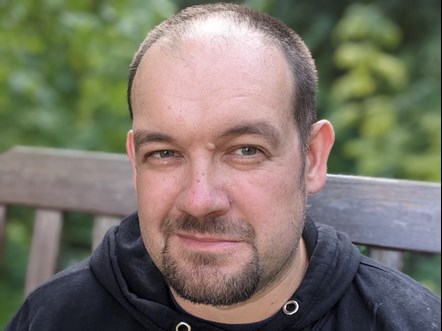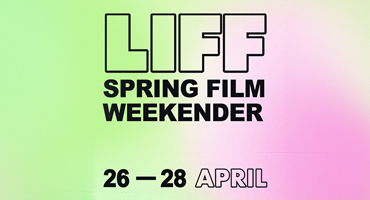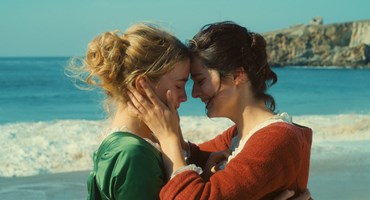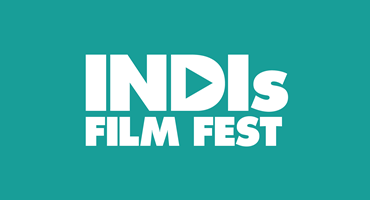Our LIFF Behind the Scenes series brings you interviews with a wide range of people working in film exhibition who all have a connection with Leeds International Film Festival.
Here, we talk to Laurence Boyce, Head of Programme for PÖFF Shorts (Black Nights Film Festival) and a film journalist who has written for Screen International, The Guardian, Variety and more...

I was born in Leeds (specifically in Headingley, a scant few miles away from the Hyde Park Picture House) and began working at LIFF in 1999, doing a variety of jobs during my time there. These varied from press to programming, to introducing films and conducting Q&As, and helping organise the National Young Filmmakers Award Day (which has since evolved into the INDIs Festival). While I worked on many things, short films became a particular speciality through my work on the LIFF short film programme.
In 2006 I went on to become the director of the Hull International Short Film Festival and in 2010 I went to Tallinn in Estonia and became part of the Black Nights Film Festival. I currently serve as the Head of Programme for PÖFF Shorts, the short film element of Black Nights, and also work in the programming department of the main festival.
Outside of my programming work, I am also a film journalist and spent many years as the Film Editor of local magazine The Leeds Guide, and have written for publications including Variety, The Guardian and Screen International. I am also the chairman of the board of the Short Film Conference, an international network of short film festivals and related organisations from across the world
I currently live in Tallinn with my ever patient partner Laura, our three children Sammy, Albie and Freddie and our dog Benno.
What do you enjoy most about working in film exhibition?
I still like showing audiences films that they might not take a chance on otherwise. Film exhibition - specifically festival programming - is like a film version of ‘all back to mine.’ You know, when you have a few drinks and a few people come back to yours and you start playing them music. “Have you heard this?” “Isn’t this fantastic”. It’s much the same, but you’re sharing the love of something with an audience in a cinema (or wherever).
It would be silly to deny that a programming job comes with all sorts of commercial and practical considerations, because it does, but deep down the programmers do it because they love it and they just want to keep that joy of celebrating film going.
What inspired you to become involved in film exhibition and what were your first steps?
I was studying Film and Literature at the University of Warwick many, many years ago. I enjoyed it immensely (and I maintain the course gave me a great grounding in what I do nowadays) but I never had a real sense of what I wanted to do after and was a bit lost. A friend of mine said “You’ve got a festival in your home town, why not volunteer for them.” So I went to Chris Fell (Director of LIFF) and basically started turning up and asking to do stuff. They took pity on me and I helped in the office (ah yes, the days of cataloguing VHS), lots of admin stuff and all that. But I got the opportunity to watch some shorts, gave some opinions and later did the same with some features. Until one day I was part of the team. And then LIFF became my life for many, many years. It still is now, even if I have now moved on to pastures new.
What advice would you give to someone who wants to become involved in film exhibition now?
Luck and persistence is still part of it. While there are few more ‘curatorial’ courses in places, there’s no real place to ‘learn’ film exhibition and programming. You just have to go in and do it. Be diverse in your tastes and be prepared to have an open mind. If you want to do more, volunteer at your local festival and try to be present and interested in all that goes on. And yes, you’ll work for free for a while. But if you keep trying you will get a chance to watch and programme. And it takes time but I think you can start to get a gut instinct about what does and doesn’t work.
What is the main change you’ve experienced in film exhibition since you started?
I hate to state the obvious, but I’m going to: the internet and digital technology. As I mentioned, I started out in the days of VHS. I have memories of sitting in a room in Leeds Town Hall and sending faxes to invite guests and confirm films. In other words, I am now a veteran (read: old).
Digital technology saw cinema enter its own punk rock era. Before it was still a realm of expensive equipment and unwieldy technology. But now everyone could pick up a cheap camera and make and edit their own movies. Just like the punk rock ethos, everyone could have a go. Of course, for every cinematic Buzzcocks or Sex Pistols, there were a large number of rubbish noise merchants. But I still remember this change and how it gave rise to new talents and gave voices to those who were previously denied.
The internet has given everyone the chance to distribute and watch movies like never before, with swathes of stuff now available at your fingertips. Of course this choice is both great and sometimes overwhelming for audiences.
What would you like to see change in film exhibition in the future?
An understanding that the theatrical experience and the home experience are fundamentally different but they shouldn’t necessarily be fighting against one another. The latter is here to stay and - despite the worriers - I think the former is as well.
I do think that festivals have always shown the way, knowing they’re a celebration of cinema and bringing people to discover the new as well as rediscovering older gems. And I think this is how the theatrical experience needs to move forward, as a celebration of being together.
Do you have a favourite highlight from working in film exhibition so far?
Again, I’m a veteran so it’s hard to single out a highlight. I remember organising Terry Gilliam to come to LIFF and name a train (don’t ask). Looking for Troy Kennedy Martin - the writer of The Italian Job - as he was meant to talk about said film at the HPPH and finding him at the pub watching an England game: which seemed rather appropriate. Speaking of the Hyde Park Picture House, I have many fond memories of co-hosting early editions of Nights of the Dead, walking out bleary eyed early the next day. And also at the HPPH with a different audience at Leeds Young Film Festival, and hosting and helping put together what was then the National Young Filmmaker’s Award Day (and has now evolved into INDIs Festival) for a number of years. Many stressful days in the office, some more relaxed ones (the day we went to the horse races - invited by a sponsor, mind) and the madness of all those festivals and the closing nights. There are also plenty of stories which, well, I should not commit to record. There are lots more after LIFF as well, but those can be left for another day
But the most I remember is that we were a team. And we were a family. There were hard times. There were brilliant times. I loved all my time at LIFF (okay, there were one or two rubbish moments - deadlines, catalogue misprints, and annoying distributors amongst them) and everything I did there taught me what I needed to know when I finally moved on. Though I still keep my hand in with LIFF here and there. They’ll never get rid of me…
Is there a film you love that you wish could be seen more widely by audiences?
Ah, my job means there are hundreds of films that have gone by the wayside. But there is one that sticks in my mind which, funnily enough, is one of the first ever I was involved with for Leeds. I fully admit that my love for the film may be tied in to my work memories of it, but it’s still great
The Nine Lives of Tomas Katz by Ben Hopkins is just a great and quirky British film, full of invention and wit, and topped by a great performance by Thomas Fisher (a hugely underrated British actor, who funnily enough, I met in Tallinn in 2019 when I introduced the film Looted, another British film which I don’t think got its due). I brought the film to Leeds in, I think, 1998 and Ben happened to be my first ever onstage Q&A. I’m sure some will say the film has dated but I think it’s a great, but sadly forgotten, British film.
Do you have a favourite cinema-going memory as part of an audience?
Again, too many to mention, but as I am talking about LIFF, I do remember a visit to Venice many years ago. Me and my then LIFF colleague Paolo Moretti (who has done alright for himself the past few years, working as director of Directors’ Fortnight at Cannes Film Festival) went to a mystery screening. It turned out to be a screening of Kim Ki-duk’s brand new film 3-Iron which I just marvelled at in its invention and humanity, and just remembering the joy of the audience. I remember we got on the phone to Chris immediately telling him we should get it. And it would be remiss of me not to say how much Kim Ki-duk is missed.
Which filmmaker’s work means the most to you?
I have all the usual suspects. Hitchcock. Spielberg. LIFF met me with an abiding love of Larisa Shepitko after the retro we did of hers way back when. But with my work in shorts, I’d like to mention Simon Ellis. I consider him a friend nowadays, and I first met him years ago on the ‘circuit’. I just think he’s a brilliant British filmmaker who perhaps is not as well-known because he concentrates on shorts. But Soft is a great British film of the 2000s. His work deals with masculinity, with Britishness, and he has an empathetic and wonderfully creative sensibility.
Which new film have you loved recently that you would recommend to audiences?
I think All the Crows in the World by Tang Yi, recently winning the Palme D’or for Best Short Film is a wonderful piece of work and deserves much love.


